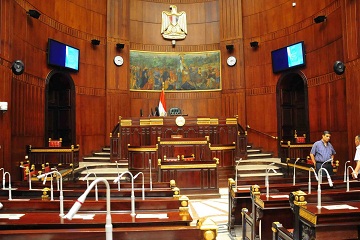CAIRO: President Hosni Mubarak’s calls for promoting private investments by offering incentives and cheaper credit has some analysts saying the government can’t just wave a magic wand to spur investments.
“The real question is: Can Egypt compete with countries such as China and Malaysia in attracting new investments? These countries want to attract pools of investments too and have vowed to do these same procedures in response to the global financial crisis, said Magdy Sobhy, senior economist at Al Ahram Center for Political and Strategic Studies.
Mubarak said in his speech – which addressed both houses of Parliament at the inaugural session of the new parliamentary round – that the cost of credit in Egypt should be lowered to maintain competitiveness of the Egyptian economy and promote investment.
“I call on the government to open new areas to private sector investment…(and) that must be accompanied by a reduction in the cost of credit, a reduction which gives investors the finance needed to expand projects and set up new projects at a cost which encourages him and preserves his competitiveness, he said.
However, Sobhy said, “These are regular procedures all countries are implementing to counter recession. There is nothing new.
“In fact, Egypt now faces bigger challenges in attracting foreign investments than before because that’s the plan everywhere else in the world.
He explained that competition to attract investments is now bigger in the face of the world’s biggest economic crisis in almost 80 years. “Everyone wants to attract investors. Britain’s Gordon Brown toured the Gulf to attract investments.
At the same time, the financial crisis has left little liquidity intact to boost investments, he said. “Liquidity surplus is not as wide as before. Gulf countries lost money invested abroad and will be more conservative with their investments in the coming period.
The government has vowed to attract new investments from less distressed countries, including the Gulf countries, India, and China. Mubarak said the government would support the private sector through incentives for investment such as lower business start-up fees for infrastructure projects as well as increasing finance available to SMEs, and reducing cost of credit for the private sector.
It was not clear whether Mubarak was calling on the central bank to cut rates or was directing his comments at commercial banks. The central bank – which raised interest rates six times this year to combat soaring inflation – says it is independent of political interference.
“This would be a negative connotation for the independence of the central bank, commented investment bank Beltone Financial in a research note. “[The President’s] statement could rather be regarded as a message to commercial banks to lower the cost of borrowing for businesses.
Egypt’s central bank ended a nine-month cycle of interest rate rises earlier this month and signaled it could ease monetary policy in the future to support growth.
With inflation falling from record levels as the global financial crisis brings down commodity prices, the central bank has increasingly emphasized risks to growth in the Egyptian economy.
Beltone Financial expects the central bank to cut its corridor interest rates by 50-100 basis points on Dec. 25 due to a decline in domestic inflation.
Mubarak also said on Sunday Egypt’s already-wide budget deficit would increase as the country spends more to avert economic slowdown.
“I have asked the government to increase investment spending and to bear a slight increase in the budget deficit which we will recover in the coming years without additional burdens on citizens, he said without giving any further details on the deficit, which the government had pledged to reduce to 4.5 percent of gross domestic product (GDP) by 2010.
Egypt had previously said its budget deficit would be stable during the current fiscal year at 6.9 percent of GDP.
Rating agency Moody’s said this year Egypt had the widest fiscal deficit in relation to government revenues of any country with a similar rating, in part due to large subsidies for fuel and food. Reducing fuel or food subsidies in the most populous Arab country, where about one in five live on less than $2 per day, is politically sensitive.
“It is possible for the government to increase spending because a large chunk of subsidies is not being spent on the ground now that costs of food and gasoline have slumped, Sobhy explained.
“Prices of wheat and corn have been sliding since [summer], and fuel prices have plunged by more than 60 percent. Technically, there are subsidies only on paper, he added.
“That is how a large percentage of state budget could go to public investment spending like the president said, he added.
Cabinet leaders previously said the government would spend about LE 15 billion on infrastructure projects including transportation, healthcare, as well as water and sewage management to stimulate growth.
It said economic growth could slow to 6 percent this fiscal year, down from last year’s record rate of 7.2 percent.


